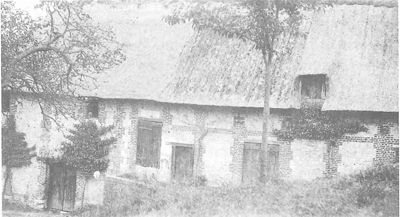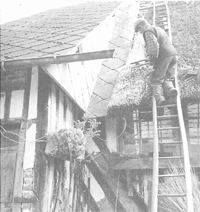
NINE
I had planned, after tea on that first day, to look over the second floor and get up to M. Braye’s house. But as the afternoon elapsed, I’d been distracted by the plumber, and then, pleased at arriving and enjoying the flood of warm weather, I’d muttered, “The essence of civilization is denial,” and taken the new imported hedge clippers out to the garden, hacked at the hedges awhile, and grabbed the opportunity to stroll around the property. I put on boots and walked down to the farthest fields above the de Longprés’ house to see that the new apple trees (new, that is, twenty years ago) were surviving, and even preparing to bear fruit this year; to inspect the ruin of the cider press and determine whether it was more advanced (because a project for the future might be to roof it, then later to make something of it); to survey the ghost of my grandmother’s walled kitchen garden, next to the old bakehouse, which was long gone, and the pumphouse, no longer in use; and finally to check the depth and population of the douet, the condition of the poplars alongside it, and the state of Mme. Vera’s vegetable garden (as yet unplanted) next to the stream. From this last, I could look up at the house and see the attic windows blazing with the reflection of the late setting sun, and the second-story windows reproaching me with their closed shutters.
Beware nostalgia, something whispered, as if what I wanted here—disguised by the diaphanous garments of romance—was what had never been and never would be again. There was no way I could take this on and make it right, not if making it right meant making it what it might have been: that would be like trying to “restore” New Jersey. What was now a dwindling, rundown farm had once been a thriving settlement. The cider press, still worked in my grandparents’ day, had been a thatched building larger than the house, its grenier filled in October with the farm’s apples until it was time for the old horse, walking in circles, like Samson, around the now vanished circular trough, to grind them into juice that would ferment in the likewise vanished wooden tuns. The building was a ruin beyond repair, probably beyond any kind of rethinking: roofless and without openings for windows, it was still bigger than the house.

The cider press, 1928.
Recovering espaliered apple and pear trees towered against the cider press’s naked brick and flint walls, whose warmth they still depended on. These were the fancy dessert trees my grandmother had planted, as Mme. Vera often bragged to me when I encountered her near the ruin, she perhaps climbing uphill with a basket of greens for her rabbits. Seeing the espaliered pear tree in flower, I realized that the other trees I had noticed blooming in the orchards might be pears in good health rather than apples uttering their last hurrah.
Near the cider press had stood a bakehouse where all the farm’s bread was once made; now it was a dangerous pit masked by nettles and wild roses. The barn and all traces of it, meanwhile, had disappeared entirely, and the horse pond was a morass of impenetrable silt and marsh. It was here that the laundry of the Frieseke household had been scrubbed and beaten before being laid out on the grass to bleach. Within the walled kitchen garden that M. Braye had kept well into the sixties were two contiguous deep water tanks, made of brick and topped with floating scum, which I noticed had now been provided with some measure of protection from drowning large animals, in the form of a camouflage of rotting boards. I had never quite understood the tanks’ purpose; they were part of the farm’s old water supply, I knew, but beyond that I did not follow the plan. The stables where my grandmother had kept the cart she used to drive to market once a week in Pont l’Evêque, before they bought the Ford, and before Georges the White Russian refugee chauffeur, an ex-cossack, joined the household (Georges would later, in a fabled romance, marry Eugénie the cook, a native of Mesnil, and live with her after the war in Paris, where he found work at the Soviet embassy)—those stables had been pulled down twenty years before, in hopeless ruin, the summer that a younger sister of mine had elected to be married in Mesnil. Following local custom, the whole town had been invited to the wedding.
The thatch on Mme. Vera’s house was going faster than I had thought; its peak had already lost the iris that held the clay that in turn held the apex of the thatch. Most of the cement fence posts along the unkempt drive had been destroyed, and the old barbed wire strung between them dragged on the ground. Dead apple trees tipped over and loomed gaunt, and the pastures pullulated with thistles, nettles, dock, brambles, bracken, and other weeds deserving of no names. The farm I was in love with looked as if it were inhabited by Snopeses—who would be me if I became the proprietor of this place.

Thatching Mme. Vera’s, 1968. Photo Mary Norris
“I am monarch of all I survey,” I murmured to myself grimly, feeling more like Ozymandias than the shipwrecked Alexander Selkirk, better known under the alias Robinson Crusoe. Now thoroughly disheartened, I’d come back up to the house thinking I had better try to control something. From chests and closets I pulled rugs and curtains to make the entire first floor seem like a place that someone might live in on purpose. I hauled armloads of purple foxglove out of the woods—some with stems as tall as six feet—to give life and color to the interior, making a huge flourish of them on the table in the dining room, where they reached up like leaning caryatids to uphold the ceiling. Yellow broom was flowering in the woods, Planta genista, which the ancestors of England’s Henry V had worn into battle on both sides of the Channel. They’d swept through this country with its blossoms stuck in their bonnets, leading to their family nickname, Plantagenet. Others—noncombatants—had, more significantly for the cause of civilization, made besoms of the same tough plant. I cut some of that also.
Next I walked around the first-floor rooms again, pointedly not looking for that wicker tray but still not coming upon it. Maybe the house was shabby, but shabby I had never minded; the illusion that the place was inhabited did me good.
One thing having led to another the day before, I had not got upstairs yet by the time I called Julia. I let her know there was nothing to collect on my flight insurance and waited, ready for her standard opening, “Is it beautiful?”
“There’s still the flight back,” Julia warned. She’d missed her cue. Instead of Is it beautiful? she was intent on the romance of air travel. She’d been talking with a friend who’d told her an airplane story she was eager to share. “It was a Chinese airline,” she said, “but still…”
The narrative concerned a passenger plane that was flying over Szechuan when the pilot and copilot ran into the passenger compartment to check on some more-alarming-than-usual noise or smell. The door to their cabin flopped shut behind them and locked automatically to protect the cabin and controls from interference by hijackers—or, now, the pilot and copilot. As the stewardesses continued to bow along the aisles serving tea, the officers attacked the cockpit’s door with fire axes while the plane …
“Jesus, you have to work your IQ down the bell curve until you get it way below the idiot level to ride an airplane. And how is everything there?” Julia asked with eager suspicion.
I began an enthusiastically favorable commentary on the weather and the solitude.
“That bad, eh?” Julia said.
“It’s beautiful,” I reminded her.
“Never mind beautiful,” she replied. “Beautiful is always someone else’s.”
After that I gave in to jet lag, which the French call le décalage horaire—a décalage being, according to my dictionary, an unwedging or shifting of the zero.…